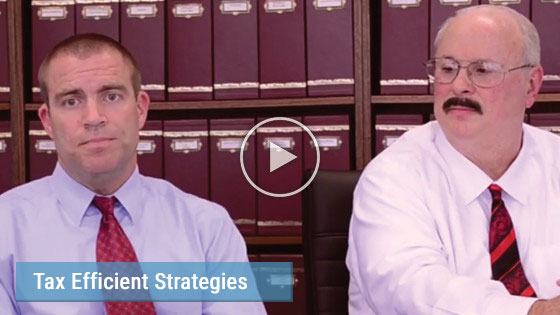 At Goodman Financial, we focus on tax efficiency wherever possible, but with a special focus in three key areas: saving for retirement, portfolio structure & management, and distributions. Proper tax-efficient planning in all three areas can have a compound effect over time and add years to your retirement portfolio’s longevity.
At Goodman Financial, we focus on tax efficiency wherever possible, but with a special focus in three key areas: saving for retirement, portfolio structure & management, and distributions. Proper tax-efficient planning in all three areas can have a compound effect over time and add years to your retirement portfolio’s longevity.
Saving For Retirement
Traditional IRAs, Roth IRAs, qualified plans such as 401(k) plans, and non-qualified (after-tax) accounts can all be utilized to build a retirement portfolio, and each have different potential tax benefits. While you are preparing and saving for retirement, we assess your situation to determine which funding vehicles you have available to use and the tax ramifications of each. Steering contributions to accounts that will give you flexibility from a tax-efficiency standpoint in the distribution phase of retirement can be just as important as the current tax savings a contribution may provide. Creating a tax-efficient investment retirement plan is about identifying the trade-offs between the tax savings of today with the tax savings of tomorrow and determining what combination makes sense for you in light of your goals.
Portfolio Structure & Management
We structure and review your portfolio on an ongoing basis keeping tax efficiency in mind. When constructing your portfolio, we will generally place the securities with the least desirable tax attributes (high dividend payers, ordinary income producers, etc.) in accounts where income is sheltered from income taxes each year, and securities with favorable tax attributes (low dividend payers, long-term capital gain producing securities, etc.) in accounts with no current tax protection.

Tax Efficient Strategies
By being strategic in our asset placement and asset allocation at the account level, we’re able to improve the tax-efficiency of your overall portfolio. As part of our ongoing maintenance of your accounts, we strive to minimize taxable gains and income where possible, including preparing a year-end gain/loss harvesting analysis.
Distributions
In the distribution phase of retirement, we assess your cash needs and help you determine how those needs will be funded from your various types of accounts. Depending on the type of account, the taxation of a distribution can vary as widely as being tax-free to being taxed at your highest ordinary marginal tax bracket. With a detailed ordinary tax analysis, we can develop a tax-efficient distribution plan for you, providing you with the funds to cover your cash needs while not unduly burdening your portfolio with taxes.
Clients' best interest is our top priority
Contact Us Today
Our goal is to meet the sophisticated financial needs of clients through prudent and personalized money management and financial advisory services. We present advice and solutions tailored to the unique needs of each client.


